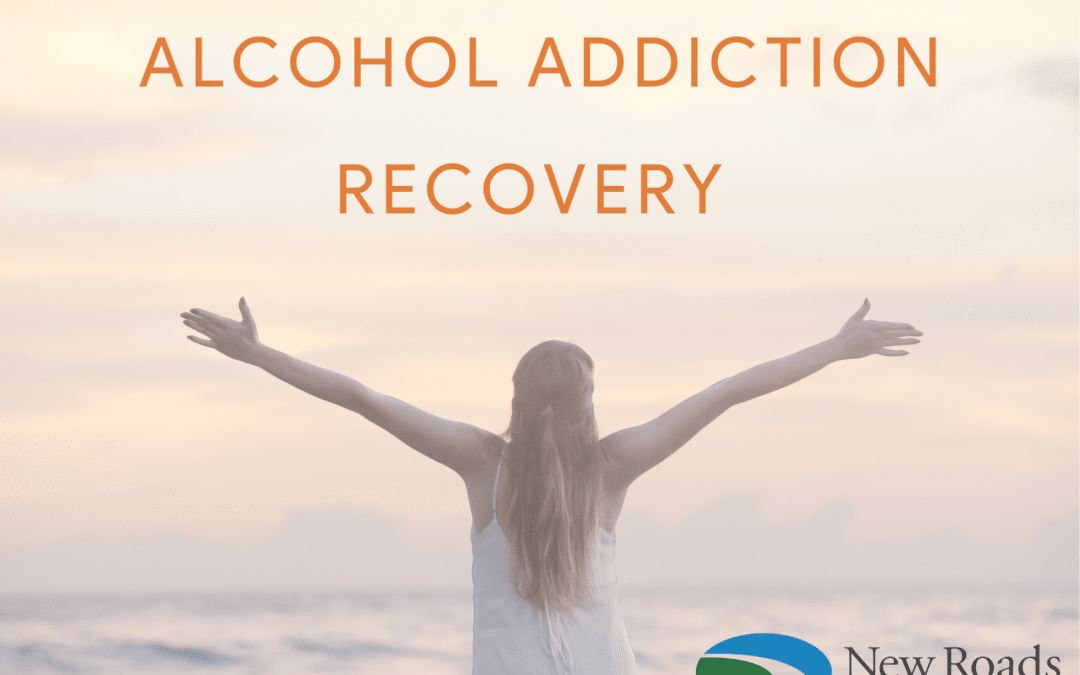Alcohol abuse is an extremely harmful habit in the United States. In fact, In 2018, 26.45 percent of people ages 18 or older reported that they engaged in binge drinking in the past month. According to the NIAAA, an estimated of 80,000 people die annually from alcohol-related causes. An addiction recovery program is imperative to overcome this dangerous addiction. New Roads Behavioral Health offers an outpatient program with enough structure and support to help get your life back on track.
The following is an article written by someone that was suffering from alcohol addiction, that was able to recover and is now living a sober life.

“I’ll never forget sitting on my bunk wondering what had happened. How did I get locked up in this cell? Fourteen months earlier, I had walked into an AA meeting after I made a phone call to the AA hotline. I was drinking on a daily basis for over three years. I had been charged with a felony in a white-collar crime involving hundreds of thousands of dollars. My drinking was no longer shielding me from the consequences of my behavior. While I was at that first AA meeting, I read for the first time the Twelve Steps shade on the wall. It was the first time I understood that there was a spiritual component to my alcoholism. I count that moment as the start of my recovery. It was August 6, 2003. My sentence hearing was 79 days later. In that small amount of time, I attended more than 150 AA meetings and managed to stay sober. I was sentenced to 14 years with a possibility of parole after four. My first year in prison was full of shame and anxiety caused by tension between my obligations. On one hand, I was in a new environment, rebuilding my life in prison. On the other, I was very much aware that I had left my four children and their mother with no means of support. I was full of shame over what my family was going through, and I was haunted by how my time in prison would affect them.
AA in prison is based on the same principles as AA on the outside. The difference is, in here we don’t usually have any old-timers to pass down the understanding of the Steps and Traditions. At that time, there were no outside AA service members assigned to our prison. We were left with what we could decipher out of the Big Book and our Twelve Steps and Twelve Traditions book on our own. This always turned into colorful discussions because we were all new to recovery and struggled with understanding the Steps and Traditions. Today in my home group, when I share my story I will ask, “Have you ever seen a fistfight in an AA meeting? Well, I have.” The meetings we ran in prison were a gift burdened by our inexperience with the program of AA. Our meetings taught all of us to personalize our recovery as best we could to our own understanding using the Steps and Traditions to guide us. Sitting on my bunk a year into my sentence, I took stock. I had managed to stay sober, work a prison job, and regain my health. I found my way back to the faith of my youth in here. Thanks to the literature, I continued to work the Steps with my fellow inmates on a weekly basis. It was in these weekly meetings I learned the value of doing a fearless and thorough moral inventory of my past, as described in the Fourth Step. The first time I and the other guys completed a Fourth or Fifth Step with each other, our work was not very fearless or thorough, yet it was enough to keep us sober. We revisited these two Steps multiple times while incarcerated.
Identifying character defects in the Sixth Step turned out to be one of the most empowering awareness Steps for me. We printed out definitions of the “seven deadly sins” and worked at matching our behaviors to these definitions. Asking God to remove those defects of character took a lot of meditation and prayer. The Tenth, Eleventh, and Twelfth Steps are the enduring points in my recovery. I found out that I could learn how to live through the suffering of imprisonment. I found out that spiritual advancement was possible, even in here. I found out that I could not only endure, but I could endure well. I saw that my suffering had value. I challenged myself to focus my efforts where I could make a difference, not only in my life but in the lives of others, especially my children. I stayed connected with my children through visits, phone calls, and letters. I can be honest with them about my alcoholism. I tell the truth and back it up with my behavior, providing us with a good foundation that continues today. I continue to focus on the values and strengths I acquired in prison, along with my growing health and spirituality.
Finally, I was granted a year’s reduction in my sentence, and my parole hearing date was set. I was so grateful to be released from prison after 1,095 days of incarceration. It was now time for me to implement my recovery and these skills in the outside world. My first year out on parole was full of mixed emotions. I was happy to be out of prison but fearful of what the future held. I was able to keep up with my recovery and my AA meetings while I found work as a carpenter. Over time, I came to terms with my faith as I rebuilt trust with my children. I allowed the positive aspects of my parents and family to influence my life. I let family and friends see my failures and talk about them, rather than trying to hide them. I established relationships and I was able to keep them. I was able to remarry and develop that relationship as well. All these Promises came to me. After serving my three years in prison, at the age of 46, I enrolled as a freshman at our local university. I was determined to use what I had learned about myself and my alcoholism to help others who have faced the same challenges and struggles. I received a bachelor’s degree in social work in 2011 and went on to graduate school. In 2012, I received a master’s degree in social work. I was 51 and starting over with a new career and a new life. I was hired as a therapist by a national behavioral health company that focuses on mental health and addiction. Within a year, I was promoted as program director, and two years after that I was promoted as chief operating officer. Today I can help those who suffer with mental and physical health issues that come with addictions.
In 2016, I was released from my 10-year parole sentence. I am now free in every sense of the word and have become a better version of myself by staying close to AA and implementing the Twelve Steps into my life. Thanks to AA, I was able to hold on long enough to let the miracle happen to me and my family.”
Article Source: https://www.aagrapevine.org/magazine/2020/jun/working-insid

Alcohol Addiction Recovery
Alcoholism is a scary disease, and it comes with dangerous consequences. New Roads Behavioral Health invests heavily in the training of staff, including front line staff, to ensure the ability to meet the unique treatment needs of multi-problem clients, enabling them to build a road towards a life worth living.
What Are The Next Steps For Alcohol Recovery?
Your next steps involve being proactive. In other words, take action to prepare for healing. Contacting a reputable alcohol rehab facility will be the first step on your road to recovery.
Once you get in touch with a rehab, an intake coordinator will start the admission and insurance verification process. Next, you can schedule an evaluation to determine what treatment program and therapies will work best for you.

How Does Our Program Work?
Individuals are encouraged to work on evaluating their lives and making positive changes that will help them to avoid situations that lead to drug and alcohol use. Masters-level therapists and experienced counselors work with individuals to identify their challenges and help them plan for a better life free of addiction.
Don’t let alcohol abuse take any more from you or your family. Let our team at New Roads Behavioral Health help you on your new journey.
New Roads Behavioral Health
2450 E Fort Union Blvd.
Cottonwood Heights, UT 84121
1-888-358-8998
info@newroadstreatment.com

